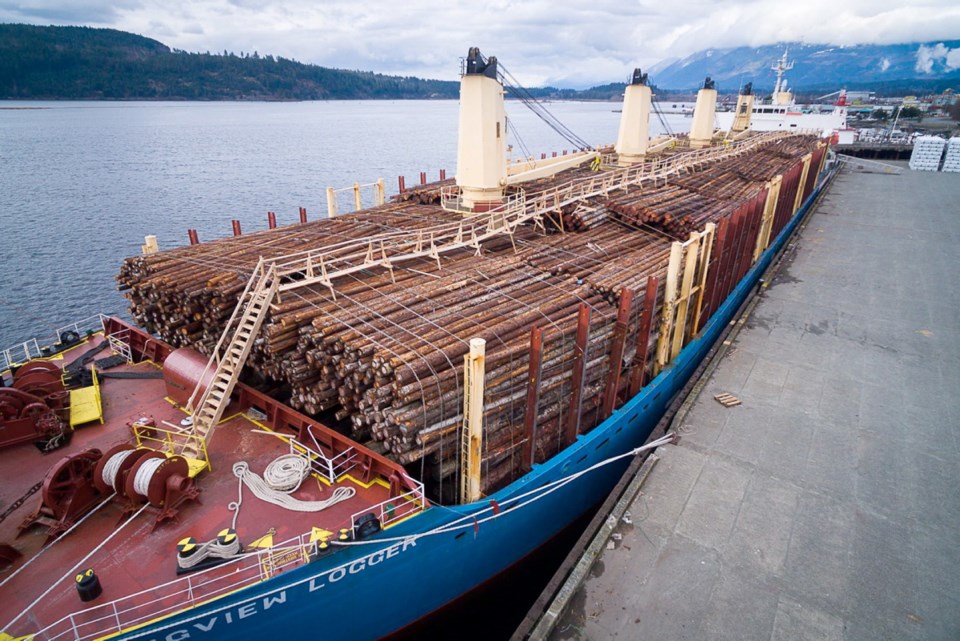A move by Teal-Jones Group to shut down all its logging operations on Vancouver Island and in the Fraser Valley highlights a deepening crisis in the coastal forest sector, the B.C. Truck Loggers Association said Tuesday.
Dave Elstone, executive director, said the latest news comes amid a lengthy strike at Western Forest Products and plans by Interfor Corp. to permanently close a sawmill in Maple Ridge.
“This is not a Teal-Jones story,” said Elstone, whose association represents logging contractors. “We’re actually in a crisis here. I don’t know if everyone’s woken up to the fact yet.
“It’s one thing when one company maybe takes some down time, but you’ve got almost all the major players taking a break here and that has a huge impact,” he said.
“Contractors are bearing the brunt of this and they don’t earn enough return when things are going good to help sustain them through tough times like this. So it’s a very painful thing to take.”
Teal-Jones announced at the end of May that it was shutting down its second-growth logging operations at Honeymoon Bay on Vancouver Island, but continuing to log old-growth trees.
Now, it’s shutting down all logging operations at Honeymoon Bay and in the Fraser Valley, citing weak lumber markets and the high cost of fibre.
“We will curtail until the economics make more sense,” Gerrie Kotze, vice-president and chief financial officer, said in an interview Tuesday. “Of course, today it’s difficult to predict exactly when that will be.”
Teal-Jones said low lumber prices, high stumpage rates and new regulations that require harvesters to remove more waste wood have made it impossible for the company to operate economically.
The shutdown will result in “substantial loss” of employment for the company’s forestry workers and contractors, the company said in a statement.
“In addition, the reduction of fibre flowing to Teal’s milling operations will result in downtime and lost wages at the company’s lumber, shake and shingle mills in Surrey.”
Forests Minister Doug Donaldson extended his sympathy to the families and communities affected by the shutdown and said his ministry has activated its program to help workers.
He pointed to a number of global factors behind Teal’s decision, including “unfair” U.S. tariffs on softwood products and a drop in lumber prices over the past 18 months due to a weak housing market south of the border.
In addition, he said there’s a scarcity of logs on the coast due to the price premium on raw-log exports. Donaldson said he’s working to fix the problem by steering more logs to domestic mills, and ensuring that more fibre is brought out of the forest during harvesting activities.
“I believe that the forest sector’s still going to remain an important part of rural communities,” he said. “We have many skilled people. We have incredible harvesting techniques and we have a sustainable sector.
“I think once this industry finds its own level then we’re going to see a really innovative and vibrant sector emerge.”
But Liberal forestry critic John Rustad blamed Premier John Horgan and NDP policies for many of the problems facing the forestry sector. “How bad does this situation have to get before the government finally takes action on behalf of forest workers in this province?” Rustad said in a statement.
“John Horgan’s policies — such as the requirement on the coast to remove more waste fibre — are killing the industry and resulting in more layoffs and closures.”
The Teal-Jones announcement comes less than a week after Interfor Corp. announced plans to close its Hammond sawmill in Maple Ridge and reorganize its forestry and woodlands operations.
At the same time, a strike at Western Forest Products is affecting about 3,000 employees and contracted workers at six Island manufacturing plants and timberland operations.
Western said last week that it expects to begin talks with United Steelworkers Local 1-1937 and independent mediator Vince Ready on Friday.
— With a file from Andrew Duffy



